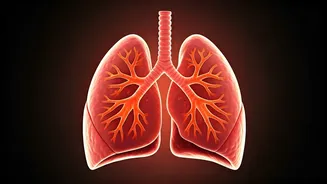Dairy's Potential Downsides
Dairy products, often a staple in Indian diets, can sometimes trigger issues for those with sensitive lungs. Some individuals report increased mucus production
after consuming dairy, which can make breathing more challenging. This isn't a universal experience; many people enjoy dairy without problems. However, for those susceptible to respiratory issues, dairy might exacerbate existing conditions like asthma or allergies. The proteins and fats in dairy can, in some cases, contribute to inflammation in the airways, making it harder to breathe freely. It is important to pay attention to your body's response and perhaps experiment with alternatives like plant-based milks if you suspect a link between dairy and respiratory discomfort. This personalized approach to dietary choices is crucial for individual well-being and health.
Processed Food's Impact
Processed foods, prevalent in modern diets, present another concern for lung health. Many processed items contain additives and preservatives that might irritate the respiratory system. These substances can sometimes trigger inflammation, which restricts airflow and hampers lung function. Additionally, processed foods often lack essential nutrients vital for overall health, which include supporting lung function. Regular consumption of such foods could contribute to weakened immune responses and increased susceptibility to respiratory infections. The high sodium content commonly found in processed options could also impact lung function by potentially causing fluid retention, making breathing more difficult. In India, where processed foods are increasingly accessible, being mindful of their impact and focusing on a diet rich in whole, unprocessed foods is key for maintaining robust respiratory health.
Refined Carbohydrates Effects
Refined carbohydrates, like white bread and sugary snacks, might negatively affect lung health. These foods quickly elevate blood sugar levels, potentially leading to systemic inflammation. Chronic inflammation is known to affect various parts of the body, including the lungs. The rapid rise in blood sugar can also create an imbalance, making it harder for the body to manage inflammation effectively. Some experts suggest that excessive intake of refined carbs can affect the lungs' ability to function optimally, particularly in individuals with pre-existing respiratory conditions. In a country like India, where refined carbohydrates are part of many meals, recognizing their potential impact and balancing the diet with complex carbs, fiber-rich foods, and whole grains is vital. These dietary changes can help mitigate the risks associated with refined carbohydrates.
Salty Food’s Influence
Excessive salt consumption can contribute to fluid retention, which can have an impact on the lungs. When the body retains fluid, it can put extra pressure on the lungs, making breathing more difficult. High-sodium foods often include processed items and fast foods, which are part of Indian diets. A diet high in salt can worsen the symptoms of conditions like asthma and COPD. This impact is mainly due to the extra strain placed on the respiratory system. Balancing sodium intake with proper hydration is critical for lung health. Opting for fresh, unprocessed foods and being mindful of salt used during cooking is a practical approach. It is about a balanced dietary approach to support overall health and well-being, especially for those sensitive to respiratory issues.
Sugary Drinks' Consequences
Sugary drinks, including sodas and fruit juices with added sugar, can be detrimental to lung health. High sugar intake promotes inflammation, a key factor in many respiratory issues. The excess sugar can weaken the immune system, making the lungs more vulnerable to infections. Drinking these beverages frequently can also contribute to weight gain, which increases pressure on the lungs. Obesity is associated with an increased risk of respiratory problems, which includes asthma and sleep apnea. In India, where sugary drinks are readily available, it's wise to limit these and choose water or unsweetened alternatives. Being mindful of these choices will support better respiratory health and overall well-being.
Fried Food and Lungs
Fried foods, a common part of Indian cuisine, can pose challenges for lung health. When food is fried, it often absorbs unhealthy fats. These fats can cause inflammation in the body, which can negatively affect the respiratory system. The fumes produced during frying may also irritate the lungs, particularly for individuals with sensitivity. Regularly consuming fried foods could contribute to a higher risk of respiratory problems. While enjoying your favorite fried dishes, it is important to be mindful of how often you consume them and consider other ways of cooking such as baking, grilling, or air frying. These alternatives can help to reduce fat intake. This helps maintain a healthier lifestyle and supports long-term respiratory health.
Alcoholic Beverages Effects
Consuming excessive amounts of alcoholic beverages could have negative consequences for your lung health. Alcohol can irritate the lungs and also weaken the immune system. This makes the body more vulnerable to respiratory infections. Furthermore, alcohol can increase inflammation, which further impacts lung function. In addition to direct effects on the lungs, alcohol consumption can contribute to other health issues. In India, where alcohol use varies, knowing the effects of alcohol on your respiratory health is important. Moderation, in this case, is the key. Being conscious of your alcohol intake and considering its effects on lung function can contribute to a healthier lifestyle and better respiratory well-being.






















